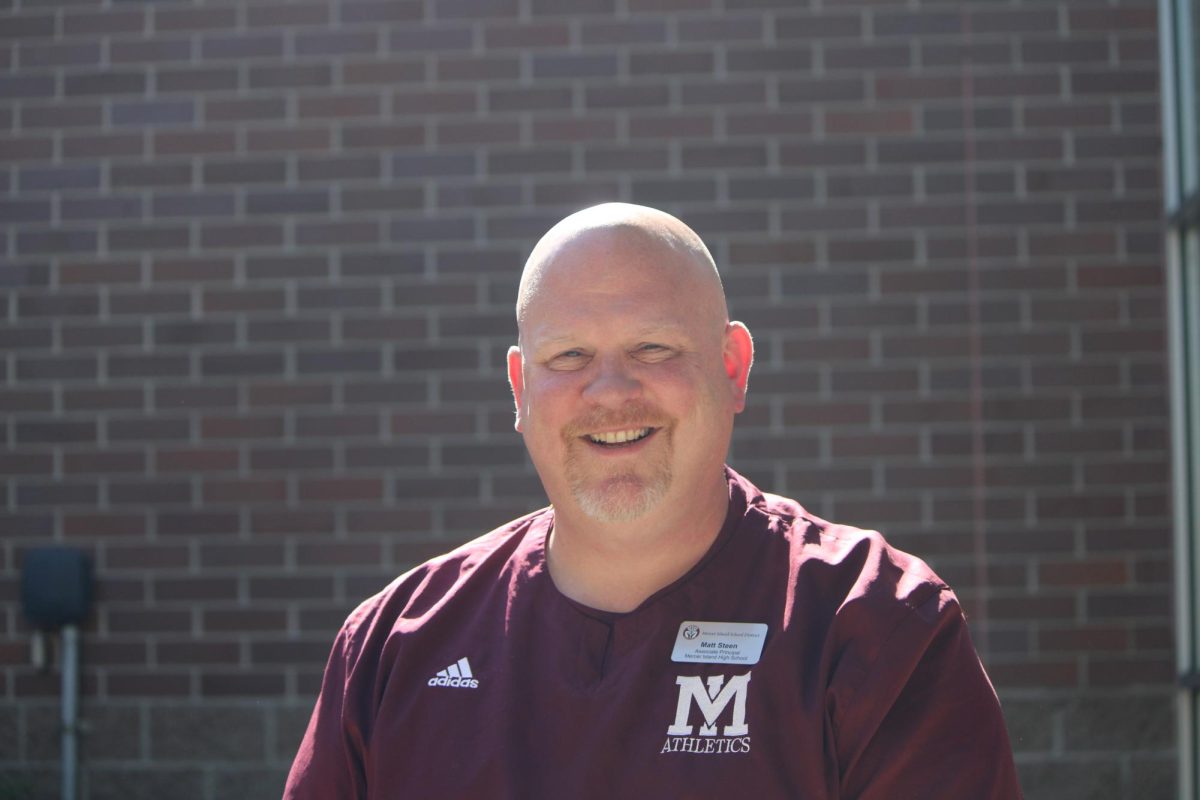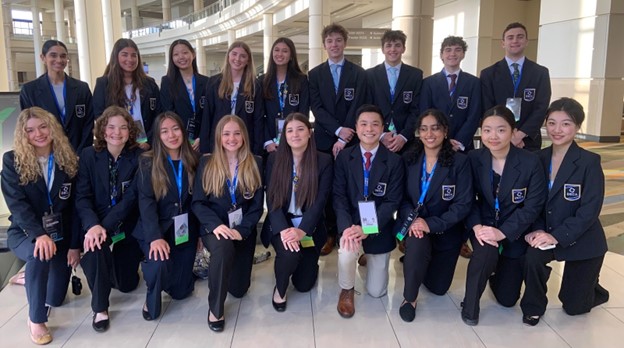Salim Nice has been mayor of Mercer Island for the past two years since being elected in 2022. As a dedicated public servant, he has tried his best to ensure that Mercer Island’s city government operates smoothly and the needs of its people are met. Using his experiences, Nice hopes to provide Islanders with a better understanding of his thought process and role in government.
“My original interest in serving on the Mercer Island City Council was trying to give something back to the city which gave me so much,” Nice said. “I grew up on Mercer Island, I moved here in 1979. I went to Mercer Crest, which was an old elementary school that is roughly where Northwood is now. I went to Island Park, met my wife in middle school, we didn’t get married until later in life, but I have Mercer Island to thank for making that connection.”
Not only did Nice grow up on MI, it also set the course for his career.
“I had a friend whose dad was in healthcare reimbursement, working with hospitals with their medicare and medicaid [and] tricare reimbursement, which kicked off a career that’s lasted thirty years,” Nice said. “Which is a really niche thing, and I would never have got into it without those connections.”
Nice ran for office as a city councilor, where he was elected in 2017. From there, his active leadership style led to him rising to the office of deputy mayor in 2019, and finally to the mayorship itself in 2022. “You don’t really run for mayor, you run for city council,” Nice said. “The city council votes after elections every two years to elect a mayor. The mayor of Mercer Island is responsible for running the council, not the city. We have a city manager who is essentially the CEO of the city, and she’s responsible for running the police, the fire, the public works, all the things that keep the city functioning day to day. The City Council is responsible for policy, spending, and budgeting.”
When asked to explain how he sees his role, Nice will respond with one word: Leadership. “My main objective is cohesiveness of the council,” Nice said. “You have seven council members who all have their own independent views, and you look to bring policy decisions before your council and bring consensus not division. We’re all nonpartisan so there’s no Democrats and Republicans, the issues on Mercer Island are typically nonpartisan issues, like roads, sewers, water and public safety. So I feel that we have a very well rounded council right now, and which is making decisions that are unifying not dividing.”
In his position as head of city council, Nice primarily focuses on the island’s long term development. “From a policy perspective my biggest focus is our Comprehensive Plan,” Nice said. “Every city in Washington does comprehensive planning on a ten year cycle, and the comprehensive plan is largely an aspirational document about where your city is heading over the next ten to twenty years. So, in that comprehensive plan we look at a lot of issues, but housing in particular is a huge issue. So we’re looking at the future of housing on Mercer Island, looking forward twenty years.”
In an area generally suffering from a growing housing crisis, which is expected to last decades, the prohibitively high housing costs on Mercer Island only add to this issue. So, Nice has to navigate between the pressures of the state at large who want increased housing density, and the citizens of Mercer Island who worry this will decrease the value of their homes. “The Growth Management Act (GMA) regulates housing in Washington, a lot of zoning and densities and things like that,” Nice said. “The GMA has prescribed a process where King County—every county in the state—but in our instance King County, has a target of houses it needs to build and a target of jobs it needs to develop. Our job is to adopt those targets as a county, divy them up into the cities and then plan for and accommodate for that housing and jobs target. In Mercer Island, if you developed everything such as a possible development for housing, multi-family, single family, you could develop about 1469 additional net new units. That’s every vacant lot, every subdivision, every underdeveloped or undeveloped property in town center. Our goal from King County is 1,239. So that’s almost 100% of our remaining capacity.”
Acutely familiar with the technical intricacies of this plan, Nice described the problem facing the council: how to convince companies to build the affordable housing mandated by the state on land which would cost so much that developing cheap housing there would not be profitable. “Our predicament over the next twenty years is that almost all of our development is in these income restricted bands, so we have to get very creative with how we create capacity on MI and incentives to build units that the market doesn’t want to build,” Nice said. “No developer out there wants to take a vacant single family home lot on Mercer Island and build 50% area median income (AMI) housing. There’s no incentive there because they could just build a single family home and sell it for three or four million dollars.”
With a limited budget, the council has to figure out the most efficient way to convince companies to do otherwise. “We don’t need to focus our energy on making these three or four million dollar single family homes, that’s not the mission,” Nice said. “That will naturally happen without any sort of effort on our part, it’s happened traditionally. So our role here is subsidizing the affordable housing required by the state. For example in town center, if you own a property you could legally develop it two stories tall, but if you’re going to add housing, and at least 10% of it is affordable housing, we’ll let you go to five stories tall. So that’s one kind of subsidy that can serve as an incentive. Another type of incentive is called the Multi Family Tax Exemption (MFTE). The MFTE says that if you want to build this building in town center and go to five stories, and you built 20% affordable housing, then what we would do is not have you pay your property taxes. We’ll have the rest of the Island pay that property tax, so the tax incentive is offset by the rest of MI. This is the world that we’re almost exclusively living in right now, and we’ve got some of the most expensive dirt in King County.”
Unlike what many may expect, Nice’s role is not exclusively local. In addition to managing local issues, he also spends a large amount of his time working to advocate for the interests of Mercer Island in the Washington State Legislature. “People probably don’t realize how much time I spend in Olympia,” Nice said. “We’ve had a lot of legislation about police, public safety, and housing, and our role as a municipality is rolling these things out. If Olympia says they would like new housing legislation for middle housing, ultimately it’s on our back to implement it, and I think it’s important to spend the beginning of the year attending those sessions. So we spend time in Olympia trying to guide legislation to be better legislation and a better fit for Mercer Island. If it’s public safety for example, it’s restoring the tools and powers police need to effectively do their job. That’s a huge part of my job that many Islanders probably don’t get to see.”
I asked Mayor Nice how he would describe his philosophy towards politics, and he answered in line with the impression I’d gotten from his technocratic and highly analytical responses to questions on policy. “I look at things through the lens of leadership and not so much as politics, because as I said it’s not really partisan,” Nice said. “Mercer Island has given me a lot and my only interest in serving was trying to give something back. I have a 9 year old son who’s coming right into that sweet spot where he’s going to start making connections and making friends, and my number one concern is that I want him to feel safe. I wanted him to have the kind of connections I had, I want you to have the kind of connections I did, all the Island youth are benefitting from the support and investment we as a community are making. That kind of thought has really been my guiding light in terms of serving as mayor and serving on the council.”
Because of his commitment to his current job and focus on the Island in particular, Nice has generally been disinterested in seeking any kind of higher office. “I have a full time job as president and CEO of a healthcare company, I have to wake up very early in the morning, I work all day long,” Nice said. “I’ve been on Zoom calls all day starting from around 5:30 this morning. I don’t know that I would find this level of fulfillment down in Olympia in the Senate or the House, or in some other regional office. I think my heart has really found its place and it’s in Mercer Island.”
To conclude, Nice advised that all Islanders interested in their local government should check out their website. “We have a website called ‘Let’s Talk’, and all of our major projects which we think might generate public interest are posted there,” Nice said. “You can go there and pick things like the Luther Burbank dock project,or the ban on fireworks, or the comprehensive plan and get information and leave a comment on it. If Islanders want to learn more about what’s happening or communicate their ideas to us, this is a good platform to engage with us whenever they want without having to come to any council meetings. Washington has a lot of grounded rules around the public process and we take it very seriously. We don’t want to be taking legislative action without knowing what the public thinks, so we do a lot of surveys, we do a lot of outreach, and we measure public response from year to year. But we generally only get small touches, there’s 26,800 or so people on Mercer Island, and we’re lucky sometimes to reach a hundred of those folks.”









